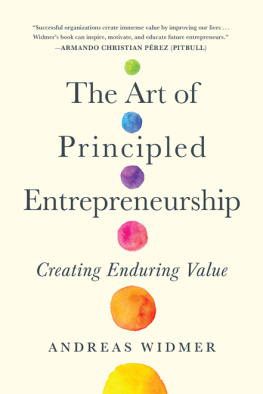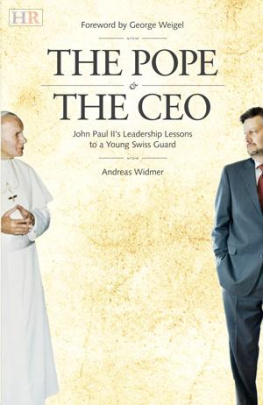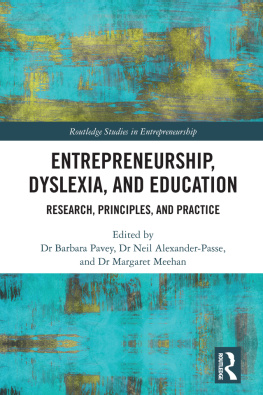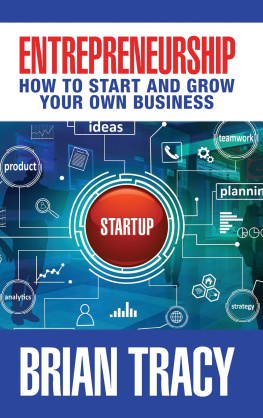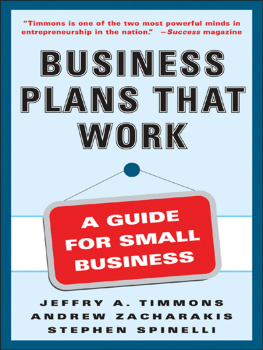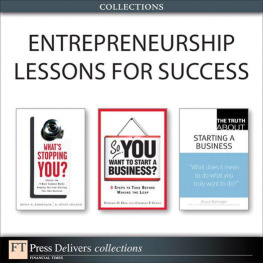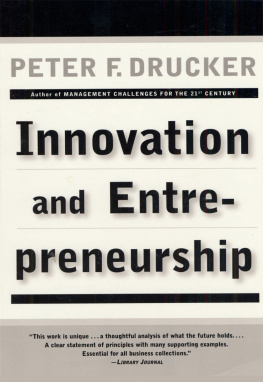Contents
Guide
Praise for The Art of Principled Entrepreneurship
In The Art of Principled Entrepreneurship, Andreas Widmer shows how business creators benefit society. Successful organizations create immense value by improving our lives. I always say we should measure success by how much you do to benefit others. Doing well by doing good is the right path. Professor Widmers book can inspire, motivate, and educate future entrepreneurs. And it will help veteran business creators recall why they chose their journey in the first place.
Armando Christian Prez (Pitbull)
Many people today argue that in business, we have to choose: creative expression, good values, or strong profits. This is a false choice, as Andreas Widmer shows masterfully in The Art of Principled Entrepreneurship. We can and should aspire to all three. This is the most encouraging business book I have read in years.
Arthur C. Brooks, Professor, Harvard Kennedy School and Harvard Business School, and New York Times Bestselling Author
The Art of Principled Entrepreneurship is a practical guide for how to do well by doing good. Through inspiring stories and actionable advice, Widmer shows how the principles of human progress provide a compass for business leaders looking to build a company that succeeds by helping people improve their lives. He illuminates an insight that must guide personal and business success: mutual benefit. If profit is generated by Principled Entrepreneurshipby creating value for othersthen your success is in harmony with the success of your customers, employees, suppliers, communities, and society at large.
Charles Koch, Chairman and CEO, Koch Industries
This is a great book about becoming and being a Principled Entrepreneur, but its so much more. Its about creating a movement, having a positive impact on peoples lives, and creating long-term value for customers. If you want to create a great company and a great team, then The Art of Principled Entrepreneurship is your recipe book.
Dina Dwyer-Owens, Franchise Business Leader, Author, and Motivational Speaker

Also by Andreas Widmer
The Pope and the CEO

This book is designed to provide accurate and authoritative information about entrepreneurship. Neither the author nor the publisher is engaged in rendering legal, accounting, or other professional services by publishing this book. If any such assistance is required, the services of a qualified financial professional should be sought. The author and publisher will not be responsible for any liability, loss, or risk incurred as a result of the use and application of any information contained in this book.
The Art of Principled Entrepreneurship copyright 2022 by Andreas Widmer
All rights reserved. No part of this book may be used or reproduced in any manner whatsoever without written permission of the publisher, except in the case of brief quotations embodied in critical articles or reviews.

BenBella Books, Inc.
10440 N. Central Expressway
Suite 800
Dallas, TX 75231
benbellabooks.com
Send feedback to
BenBella and Matt Holt are federally registered trademarks.
First E-Book Edition: April 2022
Library of Congress Control Number: 2021050582
ISBN 9781637740699
eISBN 9781637740705
Editing by Katie Dickman
Copyediting by Michael Fedison
Proofreading by Denise Pangia and Greg Teague
Indexing by Debra Bowman
Text design and composition by Aaron Edmiston
Cover design by Brigid Pearson
Cover image Shutterstock / art_of_sun
Special discounts for bulk sales are available.
Please contact .
For Carlyse & Art
Contents
Principled EntrepreneurshipTM maximizes the long-term profitability of the business by creating superior value for customers while consuming fewer resources and always acting lawfully and with integrity.
P rincipled Entrepreneurship had its origins in the 1960s, when Charles Koch first began instilling it in his approach to business. Over the years, the idea was formalized and eventually included as part of a larger Koch Industries managerial philosophyone of the Market-Based Management (MBM) Guiding Principles. Charles trademarked the term and described Principled Entrepreneurship as continuously improving your ability to create value for others in a philosophy of mutual benefit.
I had the opportunity to meet Charles several times and to bring him to The Catholic University of Americas campus to interview him about MBM and Principled Entrepreneurship in front of students. I believe his vision of Principled Entrepreneurship is aligned with the principles articulated, but only narrowly practiced, in the founding of the United States of America. It is a vision of an entrepreneurial, values-based society that flourishes and prospers through mutually beneficial commerce.
In that spirit of entrepreneurship, I humbly offer this contribution to further explore the idea of Principled Entrepreneurship and its potential to truly serve the pursuit of happiness and fulfillment in the United States and throughout the world.
H es the CEO you never heard of but should have! my friend Bob Allard told me. He changed an entire industryyou know all his products, but you do not know him. Thats because he does what business leaders should do: He focuses on creating a great team and enabling them to create great products for their customers.
Bob introduced me to Art Ciocca over dinner. Art is a very proper looking, slim, and well-groomed gentleman of average height (though, because Im 6'9", Im not a good judge of height). It was the spark in his eyes that stuck out to me. They gave him a kind of a cat-that-ate-the-canary look. Not mischievous, but expectant and excited.
We hit it off immediately. He asked me all sorts of questions. I told him about my background and the various companies of which Ive been a part, and that I am originally from Switzerland and started my career in the Swiss Guards. It took a while until I could ask my own questions of him. But when I did, he told me that he, too, had started in the militarythe Navyand how as a midshipman in college he had sailed into San Francisco Bay, standing on the deck of an aircraft carrier as they passed under the Golden Gate Bridge. He was immediately struck with the beauty of the city, finding it to be an open frontier, which, in the words of his grandfather, meant anything was possible.
A stint as an entry-level salesperson at General Foods gave him the opportunity to move from New York to San Francisco, where he eventually changed jobs and worked for the Gallo Wine Company. Shortly after that, he was hired by the Coca-Cola Bottling Company of New York to run one of their newly acquired wine companiesFranzia. I must confess that I had not heard of his company when we first met. Its unremarkable name, The Wine Group, didnt ring a bell. Art didnt linger on his company, though. Instead, he told me about his endeavors and his ups and downs in the business world. He told me the story of how he had bought the company with a very risky leveraged management buyout from Coke New York in the early 80s and how the situation had been touch-and-go for quite a while after that. Neither he nor his partners had many assets other than their homes, so they had put their entire livelihood on the line to buy this company, and faced miserable failure more than a couple of times. Early on, they had a debt-to-asset ratio of 26 to 1. If those were betting odds, the company would have had a 96 percent chance of failure.

